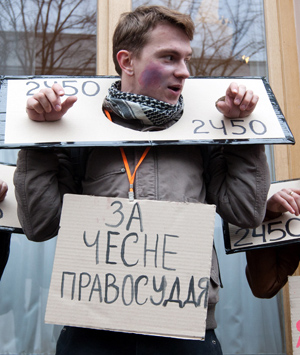Ukraine’s new criminal procedure code

Passed overnight by the Verkhovna Rada, following heated debate, this bill is now in effect as the Criminal Procedure Code (CPC) of Ukraine, replacing the previous 50-year-old Soviet-worded one. Like its predecessor, this CPC reflects political reality and is expressly adjusted to the Yanukovych administration. It is safe to assume that this code will be revised in the couple of years, maybe sooner.
CPC contains a number of dubious clauses, let alone the way the bill was passed, without consulting experts, the way the president’s team wanted it.
Those who worked out the CPC bill kept it away from the public eye. The Verkhovna Rada of Ukraine passed the bill in the first reading on January 13, with some 4,000 amendments submitted and most of them rejected, probably because the authors believed their text needed little editing, if at all. Oleksandr Yefremov, leader of the Party of Regions faction, declared that the CPC marked “a new era of relationships between the individual and the state… [when] people won’t have to spend years behind bars awaiting trial… [when] innocent individuals won’t be prosecuted, with Ukraine becoming another European democracy complete with an advanced judicial system.”
Lawyers say the new Criminal Procedure Code has innovative clauses that can benefit Ukrainian nationals, including those in the SIZO pretrial isolators. From now on individuals caught red-handed, committing acts of violence, will be thrown behind bars awaiting trial. There are broader bail and recognizance opportunities; there is also the house arrest clause with electronic tagging for limited periods – in other words, the suspect has a bracelet that will keep him “seen” by law enforcement men. This may reduce the number of SIZO inmates by 30-40 percent, and bail varies from 1,000 to 300,000 hryvnias, allowing the judge to set bail at a sum the defendant either can’t afford (thus staying in custody) or can (in which case the sum will be large enough to keep him under control and add to the central budget). Also, the number of these inmates can be lowered by the new CPC pretrial procedure timeframe: one year is the ceiling (in regard to violent crime), although even several days in SIZO can seriously damage one’s physical condition. The Soviet CPC clause about a milder legal punishment for a wrongdoer who gives him/herself up to authorities isn’t there. This is meant to put an end to the Stalinist third degree practices.
Whereas the abovementioned clauses can be described as innovative, progressive, there are a number of other ones that allow for loopholes, primarily the one nullifying additional investigation. Sounds good, considering that people are known to have spent years in SIZO, with their investigators making every effort to prove their nonexistent guilt. On the other hand, this clause allows room for maneuver and bias: instead of additional investigation, a closed case can be re-opened in view of fresh evidence. The Soviet CPC allowed additional investigation so the law enforcement agencies could save their face, if and when, and close the embarrassing case. The new CPC introduces the notion of investigating judge who is tasked with monitoring human rights in the course of investigation, examination of evidence, impoundment of the defendant’s property; also, of “special measures,” such as spying on the suspect and then deciding on his/her arrest. The big question is: “Will this judge be unbiased, considering that s/he is to be elected by a meeting of judges?”
Under the new CPC the public prosecutor will be in charge of all investigation procedures and give orders to all investigating officers. This clause worries the human rights activists. Another worrisome clause is the stated process of controversy, the equal status of the judge, defendant, and the defense counsel, while barring access to anyone except a certified defense lawyer. In other words, it will be easy for the court to handle this lawyer. Last but not least, the clause about the jury. Instead of jurors, the way they are understood across the world, the new CPC provides for the good old Soviet notion of people’s assessors, even if selected using computerized procedures (e.g., Judges Kirieiev and Vovk). This clause is even worse than the one in the Criminal Procedure Code of tsarist Russia (when it ranked with the world’s most progressive countries).
As a result, the jury will hear only cases spelling life sentence. Two of the five jurors will be judges (the rest won’t be likely to resist their opinion, especially in the countryside). Worst of all, this jury contradicts the very idea of being judged by one’s equals. Why three people’s assessors? To make it easier for the court to handle the jury?
Newspaper output №:
№25, (2012)Section
Topic of the Day





